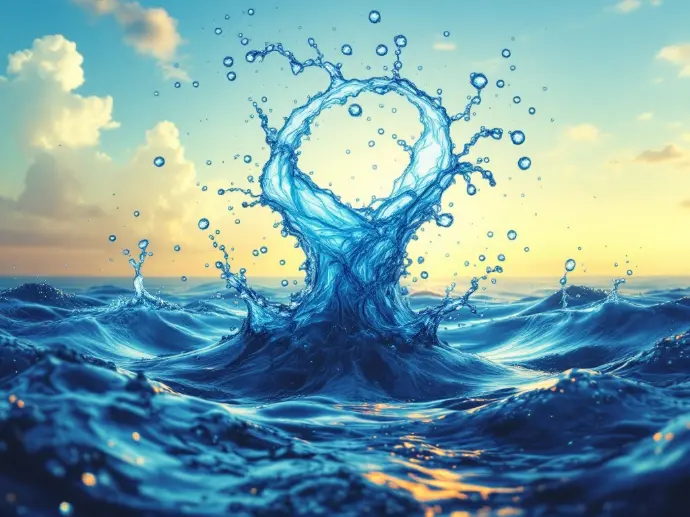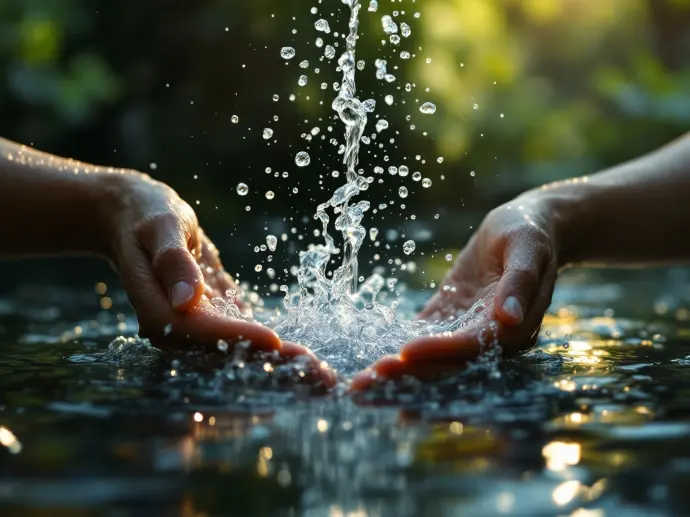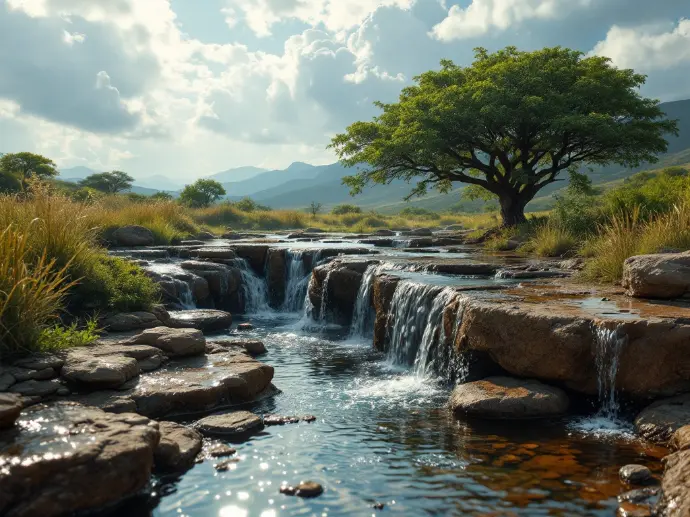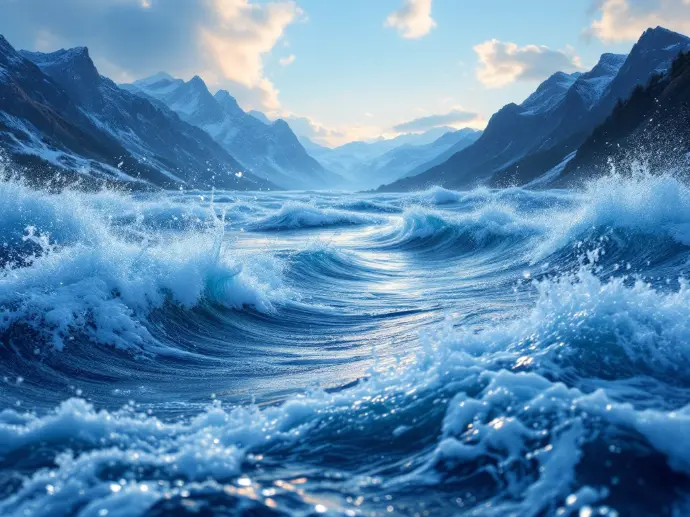The Splashy Tale of Water Through the Ages
Journey with us through the fascinating history of water with a splash of humor and insight. Discover how this vital resource shaped our civilizations, inspired our legends, and continues to sustain our lives. Perfect for health enthusiasts and water lovers!
The Dawn of Water: Earth's First Hydration
Earth's First Hydration
Once upon a time in a galaxy not so far away, a tiny blue planet named Earth was forming. Among the fiery rocks and molten lava, water made its grand entrance. Picture this: steam rising, clouds forming, and rain pouring, turning a barren landscape into a vibrant world teeming with life. And thus, our planet's first hydration system was born.
Water, in its most ancient form, was quite the trendsetter. It was the first influencer, shaping landscapes, creating oceans, and giving rise to the very first life forms. From tiny bacteria to colossal dinosaurs, water was the original life coach, guiding evolution with its nourishing presence.
Fast forward a few million years, and water is still the star of the show. It has carved out majestic rivers, sculpted mountains, and filled vast oceans. This is water's golden era, and it is just getting started. Little did it know, later to come it was going to become the backbone of human civilization.

Water and Early Civilizations: The Liquid Foundation
The Liquid Foundation
As humans emerged from their prehistoric slumber, they quickly realized that water was the key to survival. Cue the birth of early civilizations, where water was not just a necessity but a luxury. From the fertile banks of the Nile to the sacred waters of the Ganges, water was the lifeline that fueled agriculture, trade, and prosperity.
In ancient Egypt, the Nile was more than just a river; it was a god. People worshipped it, sang to it, and even wrote poetry about it. Talk about being the center of attention! This liquid gold allowed ancient Egyptians to grow crops, build pyramids, and create one of the most advanced civilizations of the ancient world.
Meanwhile, in Mesopotamia, the land between the Tigris and Euphrates rivers, water was the ultimate matchmaker. It brought people together, fostering the growth of cities and cultures. Water was the social media of the ancient world, connecting people and ideas in ways never seen before.

Water Myths and Legends: Liquid Lore
Liquid Lore
Throughout history, water has been the muse for countless myths and legends. It has inspired tales of mermaids, sea monsters, and enchanted springs. Water's mysterious properties have always captivated the human imagination, making it a central figure in folklore and storytelling.
Take, for example, the myth of Atlantis, the lost city said to have sunk beneath the waves. This story has fascinated explorers and dreamers for centuries, sparking endless debate and speculation. Was it real, or just a figment of our imaginations? Either way, water played the role of both creator and destroyer, adding drama to an already epic tale.
In Norse mythology, the mighty Thor wielded a hammer to control the storms, while Poseidon ruled the seas with a trident in Greek lore. Water was seen as both a gift and a curse, a force to be respected and revered. These stories remind us that water is more than just a resource; it's a powerful entity that has shaped our world and our beliefs.

Water and the Rise of Empires: A Liquid Legacy
A Liquid Legacy
As empires rose and fell, water continued to be the silent force behind the scenes. It was the secret ingredient in the recipe for success, allowing societies to thrive and expand. From the Roman aqueducts to the Grand Canal of China, water engineering became an art form, showcasing human ingenuity and ambition.
The Romans were particularly fond of their waterworks, building vast networks of aqueducts to supply their cities with fresh water. These marvels of engineering not only quenched the thirst of Rome's citizens but also fueled public baths, fountains, and gardens. Water was the lifeblood of the empire, a symbol of power and prosperity.
Meanwhile, in China, the Grand Canal connected the north and south, facilitating trade and communication. This monumental feat of engineering showcased the importance of water in uniting a vast empire. It was a testament to the power of water as a unifying force, bringing people and cultures together across great distances.

Water in Religion and Rituals: Sacred Streams
Sacred Streams
Water has always held a special place in religious and spiritual practices. It's seen as a purifying force, a symbol of life and renewal. From baptism to ritual ablutions, water plays a vital role in various faiths, connecting the physical and spiritual realms.
In Christianity, the act of baptism symbolizes cleansing and rebirth, using water to wash away sins and welcome believers into the faith. This ritual highlights the transformative power of water, a conduit for spiritual renewal and connection.
In Hinduism, the Ganges River is considered sacred, a divine entity that purifies the soul. Pilgrims flock to its banks to perform rituals, seeking blessings and spiritual liberation. The river is more than just a body of water; it's a living goddess, a source of life and salvation.
Water and the Age of Exploration: Charting New Waters

Charting New Waters
The Age of Exploration was a time of adventure and discovery, fueled by the quest for new lands and resources. Water was the highway of the explorers, guiding them to uncharted territories and opening up the world to trade and exchange.
Intrepid sailors like Christopher Columbus and Vasco da Gama braved the treacherous seas in search of new routes and riches. Their journeys were fraught with danger, but water was their constant companion, guiding them to distant shores and transforming the world as they knew it.
These voyages of discovery expanded the horizons of human knowledge, connecting continents and cultures. Water was the bridge between worlds, a catalyst for change and progress. It was the lifeblood of global exploration, shaping the course of history.
Water in the Industrial Revolution: Powering Progress

Powering Progress
The Industrial Revolution marked a turning point in human history, a time of rapid change and innovation. Water played a crucial role in this transformation, powering the engines of industry and driving economic growth.
Water mills harnessed the energy of flowing rivers to grind grain, saw wood, and spin textiles. This renewable resource was a game-changer, enabling mass production and fueling the rise of factories. Water was the unsung hero of the Industrial Revolution, providing the power needed to propel humanity into the modern age.
As steam engines took center stage, water continued to be a vital component, turning steam into energy and revolutionizing transportation. Trains and ships raced across continents and oceans, reshaping economies and societies. Water was the driving force behind this era of progress, a testament to its enduring impact on human development.
Water and the Environment: A Liquid Challenge
A Liquid Challenge
As the world became more industrialized, the impact on the environment became increasingly apparent. Water, once an abundant resource, faced new challenges as pollution and overuse threatened its delicate balance. This liquid lifeline was under siege, prompting a global call to action.
Pollution from factories, agriculture, and urban development contaminated rivers and lakes, endangering ecosystems and human health. Water scarcity became a pressing issue, with regions around the world facing droughts and dwindling supplies. The need for sustainable water management became more urgent than ever.
Efforts to protect and preserve water resources gained momentum, with initiatives aimed at reducing pollution, conserving water, and promoting responsible usage. Water became a rallying point for environmentalism, a reminder of our interconnectedness with the natural world and the need for stewardship.

Water and Health: The Fountain of Life
The Fountain of Life
Water is essential for life, a fundamental component of health and well-being. It's the elixir of life, hydrating our bodies, nourishing our cells, and maintaining balance. From quenching thirst to supporting vital functions, water is the ultimate health tonic.
Proper hydration is key to physical and mental performance, aiding digestion, circulation, and temperature regulation. Water flushes out toxins, boosts energy, and promotes clear skin. It's the original super drink, a natural remedy for what ails us.
In recent years, the importance of clean and accessible water has become a global priority. Efforts to improve water quality and access have taken center stage, with initiatives aimed at providing safe drinking water to communities in need. Water is a basic human right, a cornerstone of health and development.



Water and the Future: Navigating New Currents
Navigating New Currents

As we look to the future, water remains a critical resource, shaping the course of our world. Climate change, population growth, and technological advancements present new challenges and opportunities, calling for innovative solutions and collective action.
Water conservation and management will be key to addressing the challenges of a changing world. From desalination and wastewater recycling to smart irrigation and rainwater harvesting, new technologies offer hope for sustainable water use. Innovation and collaboration will be essential in navigating the currents of the future.
As we continue to explore the potential of water, we must also embrace our responsibility to protect and preserve this vital resource. Water is the thread that weaves through our history, our present, and our future. It's up to us to ensure its legacy endures for generations to come.
Water has been a constant companion throughout history, shaping civilizations, inspiring legends, and sustaining life. It's a reminder of our interconnectedness, a symbol of resilience and renewal. As we move forward, let's celebrate the power of water and commit to its stewardship, ensuring its legacy continues to flow.